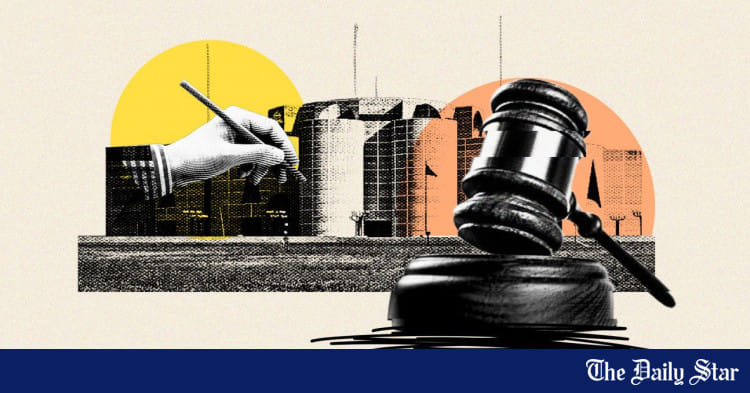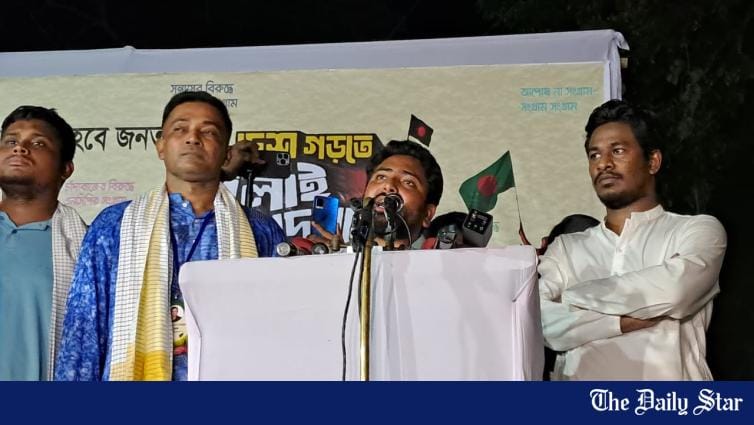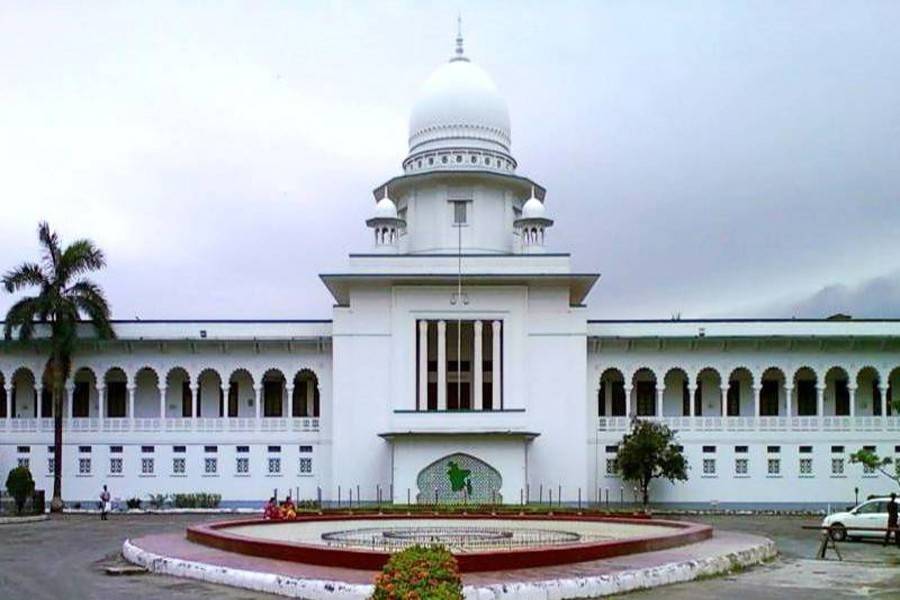Saif
Senior Member
- Joined
- Jan 24, 2024
- Messages
- 16,093
- Likes
- 8,059
- Nation

- Axis Group


MPs may enjoy freedom in parliament except on no confidence motions, finance bills
This consensus was reached during discussions between political parties and the National Consensus Commission on Tuesday. However, further talks will be held on Wednesday
MPs may enjoy freedom in parliament except on no confidence motions, finance bills
Staff Correspondent Dhaka
Published: 18 Jun 2025, 21: 38

MPs may enjoy freedom in parliament except on no confidence motions, finance bills PID
Political parties have reached a consensus on amending Article 70 of the constitution, appointing opposition party members as heads of several parliamentary standing committees, and reforming the process of appointing the chief justice.
This consensus was reached during discussions between political parties and the National Consensus Commission on Tuesday. However, further talks will be held on what the new process for appointing the chief justice should be.
The meeting reached decisions, and these are: members of parliament (MPs) will enjoy full freedom to vote against their own party in parliament on any issue except finance bills and no confidence motions.
The positions of committee chairpersons of four key standing committees— Public Accounts Committee (PAC), Committee on Estimates, Committee on Public Undertakings, and Standing Committee of Privileges — will be distributed to opposition parties in proportion to the number of seats they hold in parliament.
The meeting began at the Foreign Service Academy’s Doyel Hall in Dhaka around 11:45 am and ended at 5:30 pm with a one-hour lunch break. After the meeting, commission vice-chairman Professor Ali Riaz briefed the journalists on the day's decisions. Talks would continue with the political parties on Wednesday.
Representatives from 29 political parties and alliances, including BNP, National Citizen Party (NCP), Islami Andolon, Nagorik Oikya, Gono Odhikar Parishad, and Ganosamhati Andolan, participated in Tuesday’s talks. Jamaat-e-Islami, however, did not take part.
On the other hand, the NCP raised questions on how the process of reaching consensus. Senior joint convener Ariful Islam Adib also alleged that discussions are being centered around one individual from a particular party.
He also questioned the method by which parties were invited. Gono Odhikar Parishad president Nurul Haque echoed similar concerns. The discussion was broadcast live on BTV News.
Chief Adviser Professor Muhammad Yunus inaugurated second phase of discussion on 2 June to address key reforms that lacked agreement in the first phase of talks. Topic-based talks resumed on 3 June, focusing on Article 70, committee chair appointments, and reserved women's seats—but no consensus was reached. That adjourned discussion resumed yesterday, Tuesday. The agenda included these three issues plus the formation of a bicameral legislature and reforming the chief justice appointment process.
No consensus was reached yesterday on the proposal to increase the number of reserved women's seats to 100 and elect them through direct votes. Due to differing views among the parties, this topic will be revisited next week. Although there was some general agreement on formation of a bicameral parliament, several parties disagreed in principle. No consensus has yet been reached regarding how upper house elections would work or what powers it would hold.
Article 70 of Constitution
The Article 70 of Constitution does not allow sitting MPs to vote against their own party. If a person elected as an MP from a political party resigns from the party or votes against it in parliament, their seats is declared vacant.
The Constitutional Reform Commission had proposed changing this clause. According to their proposal, lawmakers would be free to vote against their party on any matter except the finance bill. After lengthy discussion, it was decided that MPs would have the freedom to vote against their own party except on finance bills and no confidence motions.
During the discussion, BNP standing committee member Salahuddin Ahmed proposed adding two more exceptions: constitutional amendment bills and bills related to national security.
He said everyone could agree on finance bills and no confidence motions, but other than this, if a party has any commitment, they will remain independent on that.
NCP joint convener Javed Rasin disagreed with adding more exceptions, arguing that in the past, national security had been used as a pretext to enact draconian laws, as well as constitution was amended to serve personal or party interests.
At one point in the talks, commission vicec chairman Ali Riaz said consensus was reached on two issues—finance bills and no confidence motions. If any party disagrees when the draft of the National Charter will be prepared, their dissent can be noted in the appendix.
Later in the press conference, Ali Riaz said, “We have agreed to amend the existing Article 70 so that MPs will be bound to vote in favour of their party only on finance bills and no confidence motions. For all other matters, they will enjoy freedom to vote as they choose.”
Reserved seats for women and appointment of chief justice
At present, the constitution reserves 50 seats for women in parliament, and that are allocated to the parties proportionally based on their 300 directly elected seats. A proposal was made to increase this to 100 seats and elect them through direct voting. However, no decision was reached even after discussions on 3 June and again on Tuesday.
Ali Riaz told journalists that they had long discussions on women’s representation in parliament. There was a consensus on permanently reserving 100 seats for women, but discussions will continue on the method and process. There are various proposals, and the commission hopes to reach a consensus next week.
According to the constitution, the president appoints the chief justice, but constitution does not specify who should be chosen. Some changes were proposed recommending that the president appoints the senior-most judge from the Appellate Division as chief justice.
Several parties argued for keeping alternatives, or choosing the chief justice among the top two or three senior-most judges in the Appellate Division.
Ali Riaz said there is a general consensus on amending Articles 95(1) and 48(3) of Constitution related to the chief justice’s appointment. Except for two parties, most have agreed. Further discussions will be held next week. However, an agreement has been reached on the reform of existing system of appointing the chief justice.
Bicameral parliament
The existing national parliament is unicameral. The Constitution and Electoral Reform Commissions have proposed the bicameral legislature. The lower house would be elected as it is now, while the upper house would have 100 seats, and that would be distributed based on the percentage of total votes a party receives across the country in the lower house election.
NCP agreed with the proposed voting system for the upper house and but they want candidate lists to be published in advance. BNP also supported the idea of a bicameral legislature but disagreed with the proposed election system. They want upper house seats to be allocated based on the number of seats a party wins in the lower house.
However, some parties opposed the idea, arguing that a bicameral system would be too heavy. If implemented, 200 MPs—including 100 indirectly elected women MPs—would not be directly elected, which contradicts the spirit of the constitution.
At the end of yesterday’s discussions, Ali Riaz told the journalists that several parties expressed objections to the idea of a bicameral legislature, but the majority supported forming a 100-member upper house. Talks on its formation, including the election process and powers, are still underway.
“The discussion is progressing. We hope to finalise the National Charter by July, and reach consensus on many important issues,” Ali Riaz said.
Consensus Commission members Badiul Alam Majumdar, Justice Md Emdadul Haque, Safar Raj Hossain, Iftekharuzzaman, and Md Ayub Miah were present at the discussion, while Monir Haidar, special assistant to the chief adviser on consensus, moderated the event.
Staff Correspondent Dhaka
Published: 18 Jun 2025, 21: 38
MPs may enjoy freedom in parliament except on no confidence motions, finance bills PID
Political parties have reached a consensus on amending Article 70 of the constitution, appointing opposition party members as heads of several parliamentary standing committees, and reforming the process of appointing the chief justice.
This consensus was reached during discussions between political parties and the National Consensus Commission on Tuesday. However, further talks will be held on what the new process for appointing the chief justice should be.
The meeting reached decisions, and these are: members of parliament (MPs) will enjoy full freedom to vote against their own party in parliament on any issue except finance bills and no confidence motions.
The positions of committee chairpersons of four key standing committees— Public Accounts Committee (PAC), Committee on Estimates, Committee on Public Undertakings, and Standing Committee of Privileges — will be distributed to opposition parties in proportion to the number of seats they hold in parliament.
The meeting began at the Foreign Service Academy’s Doyel Hall in Dhaka around 11:45 am and ended at 5:30 pm with a one-hour lunch break. After the meeting, commission vice-chairman Professor Ali Riaz briefed the journalists on the day's decisions. Talks would continue with the political parties on Wednesday.
Representatives from 29 political parties and alliances, including BNP, National Citizen Party (NCP), Islami Andolon, Nagorik Oikya, Gono Odhikar Parishad, and Ganosamhati Andolan, participated in Tuesday’s talks. Jamaat-e-Islami, however, did not take part.
On the other hand, the NCP raised questions on how the process of reaching consensus. Senior joint convener Ariful Islam Adib also alleged that discussions are being centered around one individual from a particular party.
He also questioned the method by which parties were invited. Gono Odhikar Parishad president Nurul Haque echoed similar concerns. The discussion was broadcast live on BTV News.
Chief Adviser Professor Muhammad Yunus inaugurated second phase of discussion on 2 June to address key reforms that lacked agreement in the first phase of talks. Topic-based talks resumed on 3 June, focusing on Article 70, committee chair appointments, and reserved women's seats—but no consensus was reached. That adjourned discussion resumed yesterday, Tuesday. The agenda included these three issues plus the formation of a bicameral legislature and reforming the chief justice appointment process.
No consensus was reached yesterday on the proposal to increase the number of reserved women's seats to 100 and elect them through direct votes. Due to differing views among the parties, this topic will be revisited next week. Although there was some general agreement on formation of a bicameral parliament, several parties disagreed in principle. No consensus has yet been reached regarding how upper house elections would work or what powers it would hold.
Article 70 of Constitution
The Article 70 of Constitution does not allow sitting MPs to vote against their own party. If a person elected as an MP from a political party resigns from the party or votes against it in parliament, their seats is declared vacant.
The Constitutional Reform Commission had proposed changing this clause. According to their proposal, lawmakers would be free to vote against their party on any matter except the finance bill. After lengthy discussion, it was decided that MPs would have the freedom to vote against their own party except on finance bills and no confidence motions.
During the discussion, BNP standing committee member Salahuddin Ahmed proposed adding two more exceptions: constitutional amendment bills and bills related to national security.
He said everyone could agree on finance bills and no confidence motions, but other than this, if a party has any commitment, they will remain independent on that.
NCP joint convener Javed Rasin disagreed with adding more exceptions, arguing that in the past, national security had been used as a pretext to enact draconian laws, as well as constitution was amended to serve personal or party interests.
At one point in the talks, commission vicec chairman Ali Riaz said consensus was reached on two issues—finance bills and no confidence motions. If any party disagrees when the draft of the National Charter will be prepared, their dissent can be noted in the appendix.
Later in the press conference, Ali Riaz said, “We have agreed to amend the existing Article 70 so that MPs will be bound to vote in favour of their party only on finance bills and no confidence motions. For all other matters, they will enjoy freedom to vote as they choose.”
Reserved seats for women and appointment of chief justice
At present, the constitution reserves 50 seats for women in parliament, and that are allocated to the parties proportionally based on their 300 directly elected seats. A proposal was made to increase this to 100 seats and elect them through direct voting. However, no decision was reached even after discussions on 3 June and again on Tuesday.
Ali Riaz told journalists that they had long discussions on women’s representation in parliament. There was a consensus on permanently reserving 100 seats for women, but discussions will continue on the method and process. There are various proposals, and the commission hopes to reach a consensus next week.
According to the constitution, the president appoints the chief justice, but constitution does not specify who should be chosen. Some changes were proposed recommending that the president appoints the senior-most judge from the Appellate Division as chief justice.
Several parties argued for keeping alternatives, or choosing the chief justice among the top two or three senior-most judges in the Appellate Division.
Ali Riaz said there is a general consensus on amending Articles 95(1) and 48(3) of Constitution related to the chief justice’s appointment. Except for two parties, most have agreed. Further discussions will be held next week. However, an agreement has been reached on the reform of existing system of appointing the chief justice.
Bicameral parliament
The existing national parliament is unicameral. The Constitution and Electoral Reform Commissions have proposed the bicameral legislature. The lower house would be elected as it is now, while the upper house would have 100 seats, and that would be distributed based on the percentage of total votes a party receives across the country in the lower house election.
NCP agreed with the proposed voting system for the upper house and but they want candidate lists to be published in advance. BNP also supported the idea of a bicameral legislature but disagreed with the proposed election system. They want upper house seats to be allocated based on the number of seats a party wins in the lower house.
However, some parties opposed the idea, arguing that a bicameral system would be too heavy. If implemented, 200 MPs—including 100 indirectly elected women MPs—would not be directly elected, which contradicts the spirit of the constitution.
At the end of yesterday’s discussions, Ali Riaz told the journalists that several parties expressed objections to the idea of a bicameral legislature, but the majority supported forming a 100-member upper house. Talks on its formation, including the election process and powers, are still underway.
“The discussion is progressing. We hope to finalise the National Charter by July, and reach consensus on many important issues,” Ali Riaz said.
Consensus Commission members Badiul Alam Majumdar, Justice Md Emdadul Haque, Safar Raj Hossain, Iftekharuzzaman, and Md Ayub Miah were present at the discussion, while Monir Haidar, special assistant to the chief adviser on consensus, moderated the event.





































